In 2009 a magazine survey found that many women in their twenties wanted to stay at home baking while their husbands went out to work: ‘I’d love to be a captive wife.’
Jessica Mann’s thoughtful and emphatic book is a riposte to this, an overview of the Fifties, which she calls a polemic and a personal memoir, winding together fact and opinion with her own experience of being, first a teenager and then a young woman at that time. The result is a richly readable and persuasive piece of work. I found myself reverently ticking the notes I took (‘Yes! Yes!’) while being reminded of aspects of those days I had forgotten — or sublimated.
Mann is the daughter of German Jewish parents who came to this country in the early Thirties, and she was briefly evacuated (without them) to America at the start of the war — a child of the times in every sense. She went on to Cambridge, married an archeologist, had four children, as well as a distinguished career not just as a writer but also as a public figure, being a member of numerous quangos.
So she is a woman who has successfully defied the obstacles that were in the way of all women half a century ago (and even subsequently). But her objective is to dispel any image of the Fifties as an appealing domestic utopia for women, and she has succeeded in hauling that often grimy era into the daylight, and pointing out the frustrations of many young wives like herself. The title is a bow to the feminist Betty Friedan’s The Feminine Mystique, which spoke out on problems which many women were afraid to admit.
Grimy. Oh dear me, yes — literally as well as metaphorically.








Comments
Join the debate for just £1 a month
Be part of the conversation with other Spectator readers by getting your first three months for £3.
UNLOCK ACCESS Just £1 a monthAlready a subscriber? Log in